We Are... the One Health Microbiome Center is a feature series that celebrates the people of the Center and the collaborative spirit we bring to “making life better” at the Center each day.
We are exploring new media formats! Check out our new trainee video features on our YouTube Channel.
Select a name below to read more.
2024 Features
Theo Newbold
Doctoral Candidate, Plant Pathology, Microbiome Sciences
March 26, 2024
By Dina Constantinides
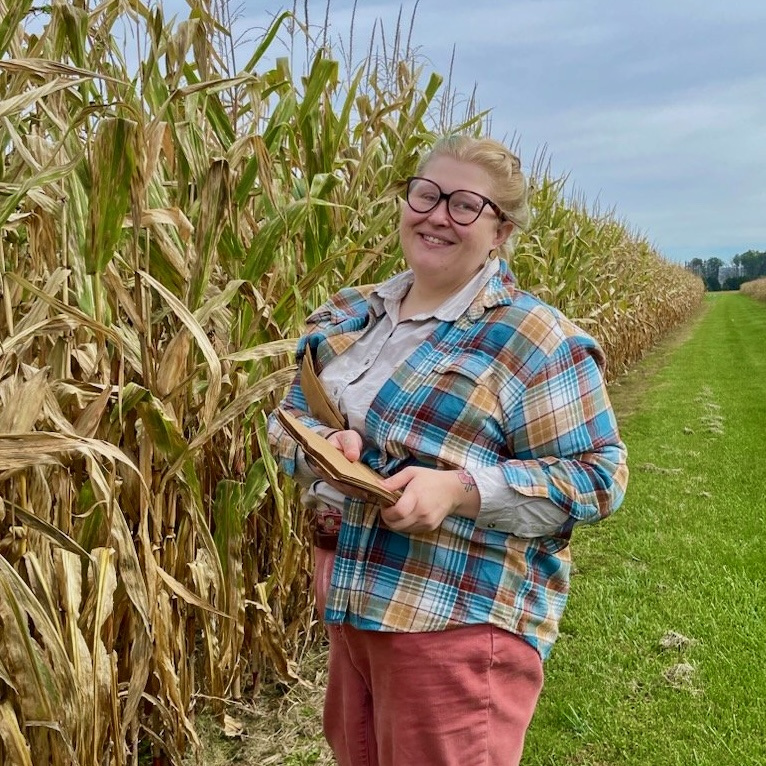
Theo is unraveling fungal leaf endophyte ecology.
Theo Newbold is a third year dual-title PhD student in Plant Pathology and Microbiome Sciences from Los Angeles, CA. As a first-generation, transgender, and visually impaired student, they have faced a myriad of obstacles with determination throughout their academic journey. After graduating high school, they earned an A.A. in Natural Sciences from Pasadena City College before attending California State University Monterey Bay to earn a B.S. in Biology. There, their interest in plant pathology flourished through a research opportunity in a fungal genetics lab. After meeting diverse scientists at their first conference, Theo felt inspired to continue pursuing a career in STEM despite their unconventional background. This led them to pursue an M.S. in Plant Pathology at Oregon State University before being encouraged by Dr. Carolee Bull and Dr. Sharifa Crandall to continue their studies at Penn State.
Now under the guidance of Dr. Sharifa G. Crandall and Dr. Gretchen A. Kuldau, Theo’s research is centered around understanding the environmental, agronomic, and host-related factors influencing fungal endophyte community composition and function in maize, a high-value crop. Fungal leaf endophytes inhabit plant tissues and can protect the plant from disease and improve nutrient uptake, or act as pathogens – negatively impacting crop yield and quality. Therefore, Theo highlights the importance of understanding the basic ecology of these organisms and how they respond to different environmental conditions such as drought, seasonal uncertainty, and management practices, like organic vs. conventional farming and cover-cropping. As a research fellow for the Foundation of Food and Agriculture Research (FFAR), they also collaborate with local farmers and utilize soil health data to explore associations between agrochemical usage and soil health parameters. Theo is most excited to understand asymptomatic colonization of plant hosts by pathogenic fungi and to potentially apply this understanding to improve management practices.
In the future, Theo hopes to enter the agricultural industry and work to address large-scale agricultural problems such as fungicide resistance. Outside of their research, they enjoy expressing themself creatively through visual art, reading sci-fi novels, and working with organizations like the departmental Diversity, Equity, and Inclusion Committee to advocate for underrepresented and marginalized communities in STEM.
Click here to see Theo's video feature.
Susan Tian
Doctoral Candidate, Biochemistry, Microbiology, and Molecular Biology
March 26, 2024
By Dina Constantinides
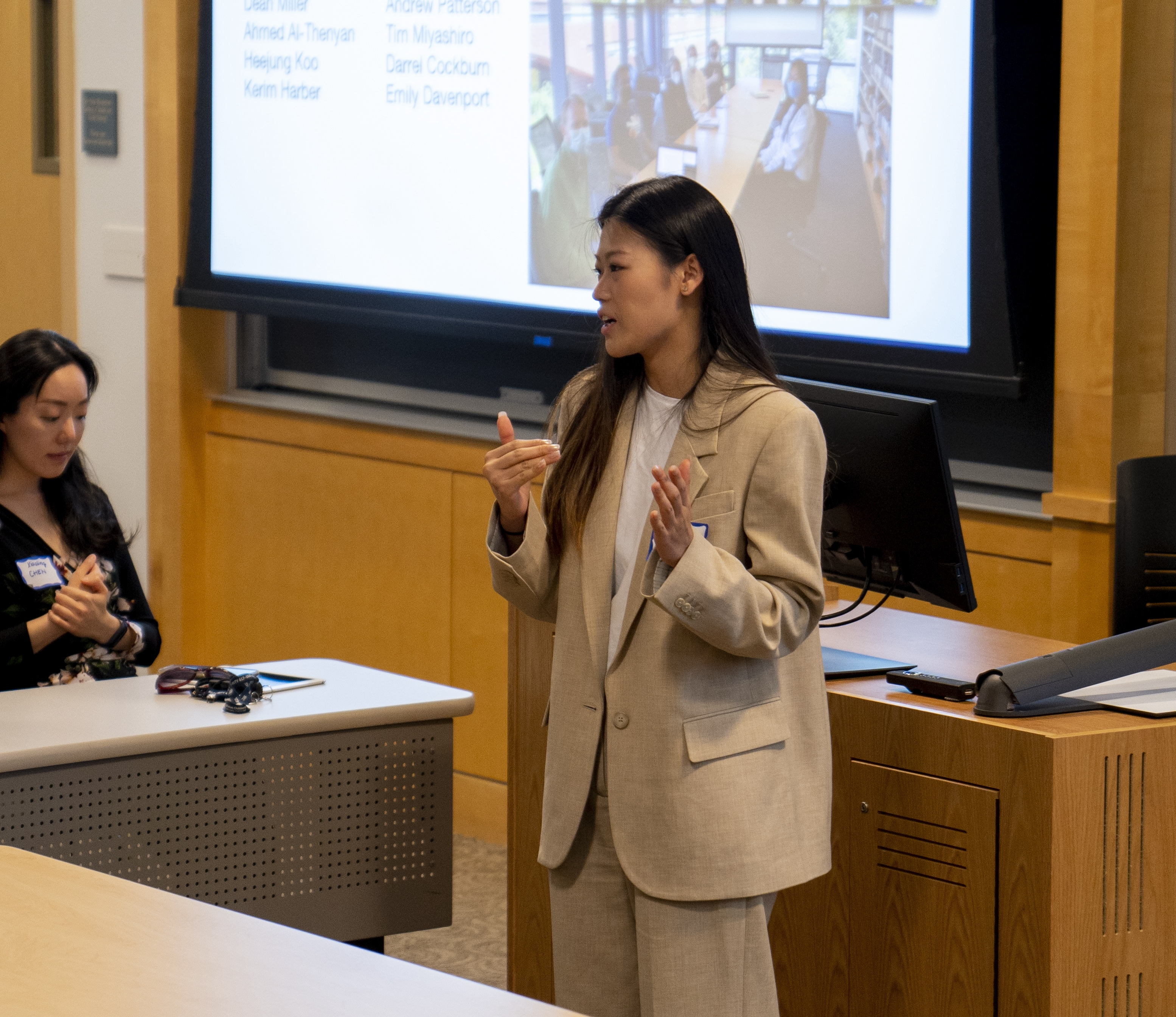
Susan is revolutionizing C. difficile treatment.
Susan Tian, a forth year PhD student in the Biochemistry, Microbiology, and Molecular Biology (BMMB) program, is originally from Zhuhai, China. She began her academic journey in 2015, initially pursuing business management at the University of Toronto, but quickly transferred to the Rochester Institute of Technology (RIT) to earn a bachelor’s degree in biotechnology and molecular bioscience with a psychology minor. During her undergraduate education, Susan served as a teaching assistant, completed a summer internship in food safety, and conducted research on bacterial survival kinetics and gene deletion in plant pathogens. Following graduation, she worked for Litron Laboratories in Rochester, where she worked on an Irritable Bowel Disease (IBD) study and genotoxicant testing in mice. This experience left her wanting to know more about the gut microbiome and how it is shaped by food and medications.
Now working in Dr. Jordan Bisanz’s lab at Penn State, Susan has found the perfect environment to explore these questions. Her research is focused on using a meta-analysis driven approach to design synthetic microbial communities that can inhibit the bacterium Clostridioides difficile in both in vivo and in vitro models. Individuals are most at risk of presenting C. difficile infection-related symptoms following the use of antibiotics, including watery and bloody diarrhea and severe colon inflammation. Fecal microbiota transplants can be a solution to recurrent infections, but there is also the risk of transferring unwanted microbes (such as other pathogens) and phenotypes, and the microbial community varies across treatments. Susan is developing a more controlled version of this procedure, where patients receive a defined microbial community that is safe and effective for their needs. Promisingly, she has successfully pinpointed one bacterium equipped with an amino acid-fermentation pathway that can suppress C. difficile through nutrient competition.
Outside of her research, Susan serves as the Vice President of the BMMB Graduate Student Association, as well as the Secretary of the Data Analysis Working Group (DAWG). She keeps herself busy with her many hobbies, including horseback riding, boxing, Tae Kwon Do, and nail art. She has no limits for her future career goals but hopes that she can contribute to advancing personalized medicine.
Click here to see Susan's video feature.
Edwin Omar Rivera-Lopez
Doctoral Candidate, Food Sciences, Clinical & Translational Science
March 15, 2024
By Dina Constantinides
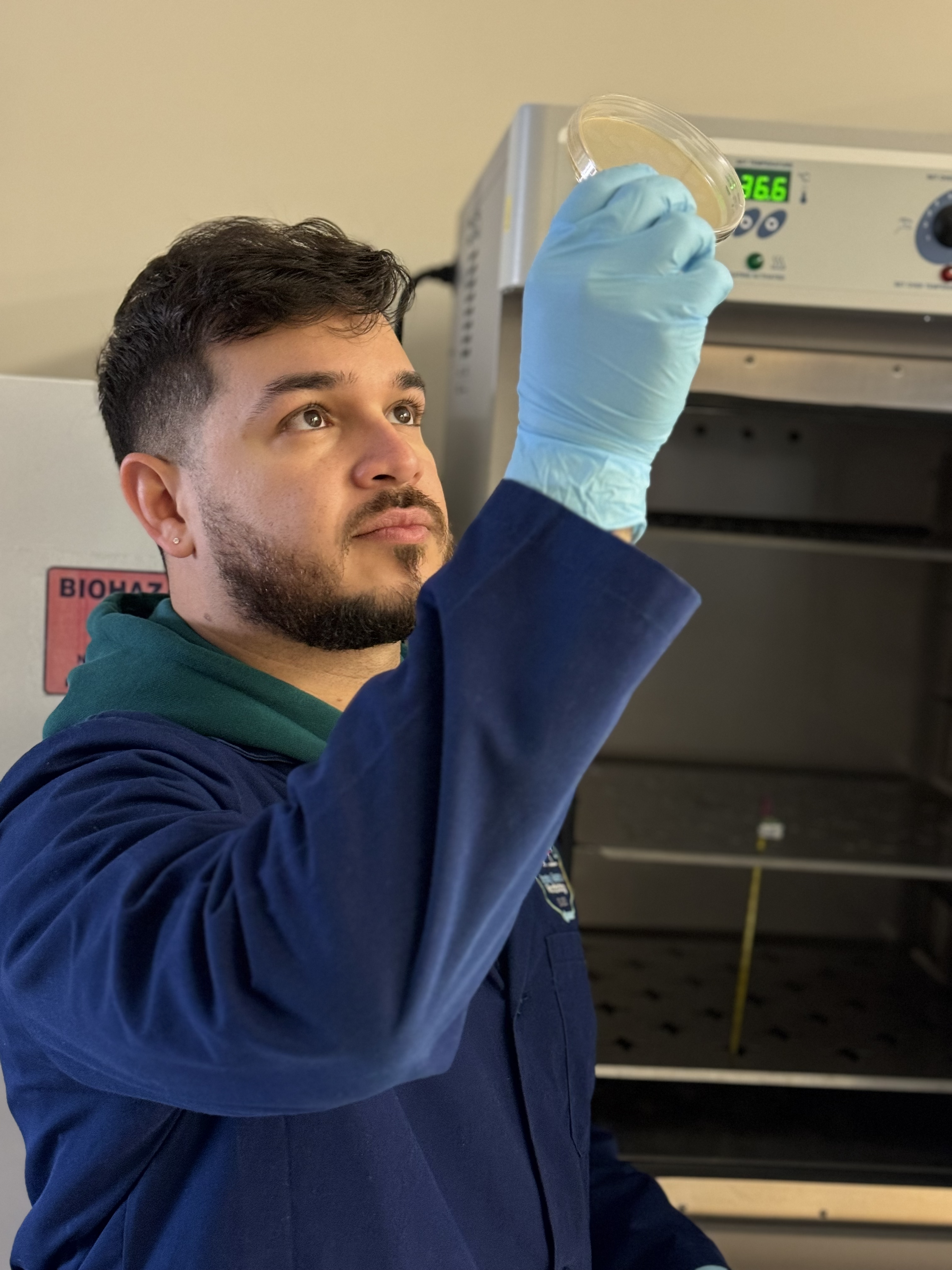
Edwin is predicting phage susceptibility of food-borne pathogenic bacteria.
Edwin Omar Rivera-Lopez is a second year dual-title Ph.D. student in Food Science and Clinical and Translational Science. Growing up in Puerto Rico, Edwin's scientific journey began while participating in local science fairs in elementary school. He went on to earn a B.S. in Biology from the University of Puerto Rico at Mayagüez. Combining his knowledge of biology and interest in food science, he worked as an intern at a food production company and an artisanal wine company, where he became curious about the connection between microbes, food, and human health. This interest led him to earn a Master's in Food Science and Technology focused on molecular microbiology at the University of Puerto Rico, where he also served as an undergraduate mentor, teaching assistant, and employee for a drinking water compliance center. Additionally, he earned an online Master's degree in Quality, Hygiene and Food Safety from the University of Nebrija in Madrid during this time. After being introduced to Dr. Edward G. Dudley at a conference, he was immediately intrigued by his research on food-borne pathogens and decided to pursue a Ph.D. in the Dudley Lab at Penn State.
Edwin's doctoral research focuses on understanding the relationship between bacteria and bacteriophages, particularly diving into the mechanisms of phage resistance. He recently received the Interdisciplinary Innovation Fellowship from the One Health Microbiome Center, which will support his project developing a model to predict phage susceptibility of E. coli 0157:H7 using machine learning. This interdisciplinary approach allows him to utilize and strengthen both his wet lab and computational analyses skills. He is most excited to advance his bioinformatics and machine learning knowledge and contribute to the expanding use of Al in biological research.
As a first-generation Latino student, Edwin faces language barriers with determination. He expresses gratitude for the unwavering support of mentors, highlighting Dr. Carlos Ríos-Velázquez from the University of Puerto Rico at Mayagüez. In the future, he hopes to continue doing research as a postdoctoral scholar and is open to new opportunities to grow as a scientist. Outside of his research, Edwin enjoys hiking, going to the gym, and spending time with friends and family.
Rachel Herschlag
Doctoral Candidate, Bull Lab
February 20, 2024
By Dina Constantinides
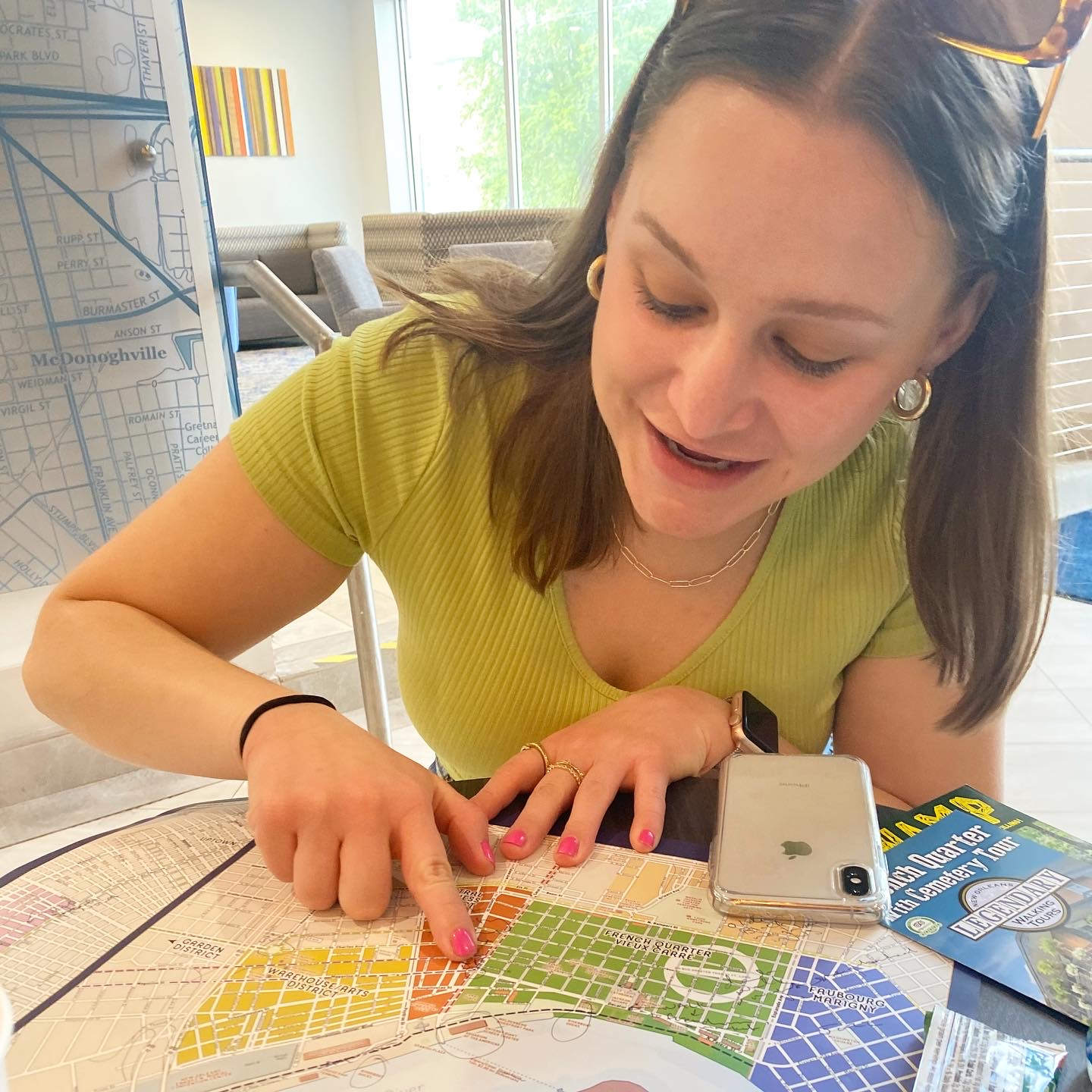
Rachel is revolutionizing seed-borne pathogen detection
Rachel Herschlag, a 4th year Ph.D. student in Plant Pathology from Easton, PA, traces her fascination with plants to her childhood interest in rescuing dying plants from garden store clearance sections with her grandmother. These fond memories blossomed into a lasting passion for natural sciences, leading her to obtain a B.S. in Ecology and Evolutionary Biology from Tulane University and an M.S. in Plant Pathology from Louisiana State University. She then spent time working as an arborist in Washington, D.C., diagnosing diseased trees and creating pest management programs. Wanting to expand her knowledge on plant pathology, she came to Penn State to work as a research technologist in Dr. Carolee Bull’s lab, who now serves as her Ph.D. advisor.
Rachel’s research is centered on developing new detection methods for seed-borne pathogenic bacteria infecting plants, with the goal of finding a method that could be used for any pathogenic bacteria. She is currently working with Pseudomonas syringae, a group of seed-borne plant pathogens affecting a wide variety of plants, including agricultural crops such as cucurbits, beet and chard. Seed companies aim to ensure that farmers receive “clean seed” that is free of pathogens. However, performing seed testing can become extremely expensive and time consuming. Pseudomonas spp. are common members of the seed and plant microbiome. Strains can range from pathogenic to beneficial. Due to the relatedness of pathogenic and non-pathogenic strains, current P. syringae detection methods can result in a large number of false positives. Rachel is experimenting with multiple novel approaches to pathogen detection in seeds and is excited by the potential impacts of her research to agricultural seed production and beyond.
Rachel is thankful for her committee members and the continuous support she has received for her “weird ideas.” After completing her Ph.D., Rachel plans on moving to New York City to explore her career options and dreams of starting her own company someday. Outside of research, she enjoys playing tennis, experimenting with fashion, and studying politics and local history.
Emily Van Syoc
Postdoctoral Researcher, Bordenstein Lab
January 30, 2024
By Dina Constantinides
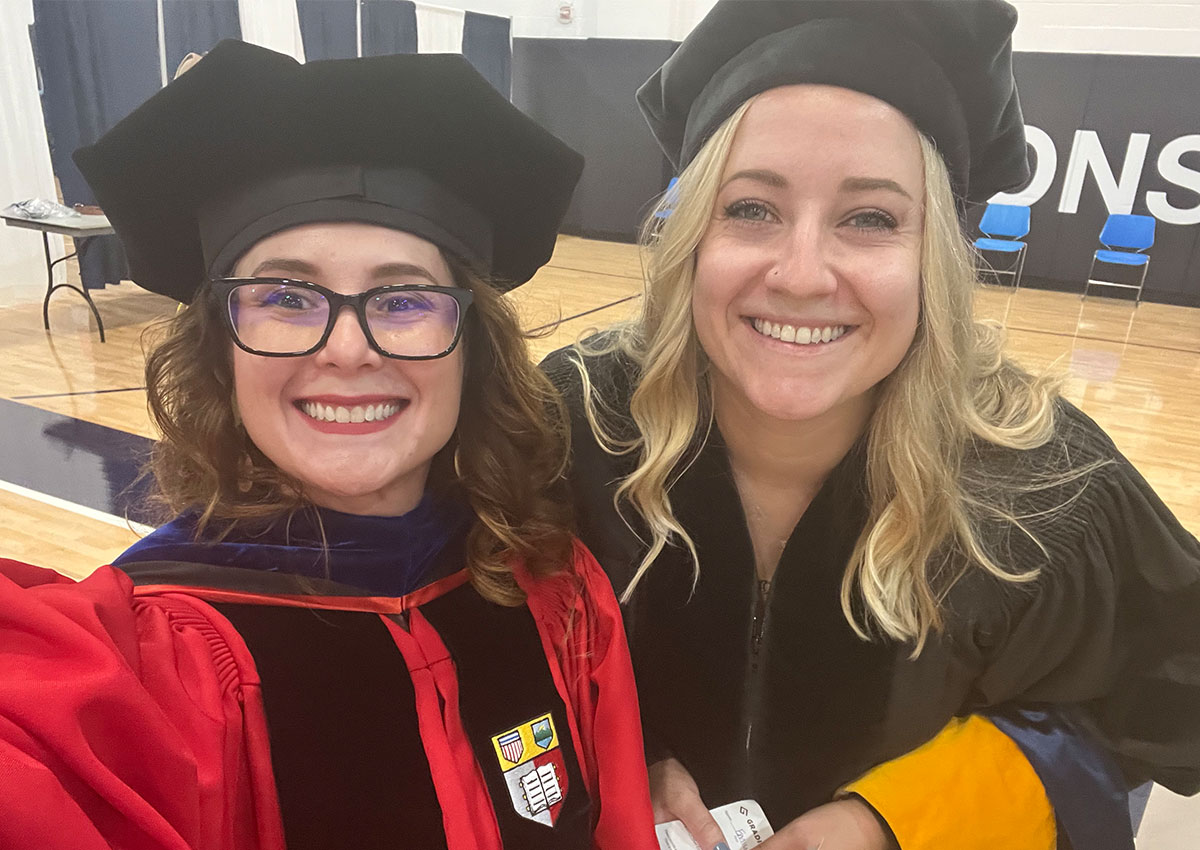
Emily is illuminating the role of human gut fungi
Dr. Emily Van Syoc is a postdoctoral researcher in Dr. Seth Bordenstein’s lab and holds a dual-title Ph.D. in Integrative & Biomedical Physiology and Clinical & Translational Science from Penn State. Her interest in science dates back to her childhood love for animals while growing up in California. As a high school student, she volunteered at animal shelters and was inspired by an anatomy class that allowed her to shadow veterinarians. This led her to pursue a B.S. in Animal Science with a Minor in Sustainable Agriculture at California Polytechnic State University. With a newfound fascination for research, she moved to the University of Wyoming to earn an M.S. in Soil Science. Deciding to move in a more clinical direction following her Master's, she joined Dr. Erika Ganda’s and Dr. Connie Rogers’ labs at Penn State to study the gut microbiome and metabolic diseases for her PhD.
Now, Emily is exploring the evolution and function of fungi as an element of the gut microbiome. It is well-established that fungi play an essential role in soil and plant microbiomes, but little is known about fungal communities (mycobiomes) within the human gut, as they are challenging to study and often excluded from research in this field. Through her research, Emily aims to decipher the genetic, evolutionary, and/or symbiotic components potentially influencing the presence and abundance of gut fungi in different individuals. To do this, she is employing advanced bioinformatic tools and phylogenetic analyses on existing datasets and twin studies.
Emily is pushing boundaries in the human microbiome field and hopes to prove that fungi in humans are worth studying. She credits her scientific success to her fantastic mentors and collaborators who supported her development and intends to pass that forward to the next generation of scientists as an academic PI. Outside of research, Emily enjoys playing the harp and spending time outdoors with her husband and dog, Cerberus.
2022 – 2023 Features
Wei Wei
Doctoral Candidate, Bioinformatics
December 5, 2023
By Dina Constantinides
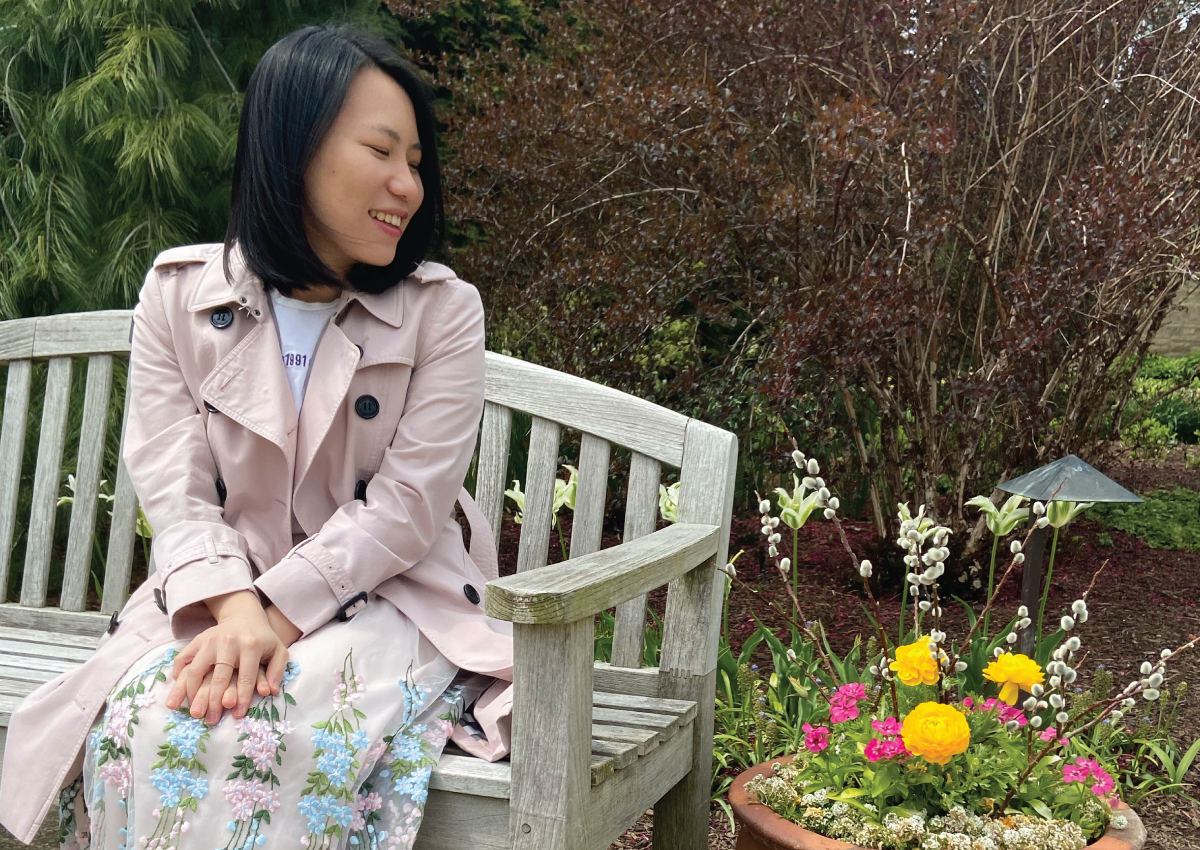
Wei Wei is discovering novel methods to model metagenomic data
Wei Wei, a Bioinformatics PhD candidate, was born in China and lived most of her life in Singapore. Naturally, she exceled in math, leading her to study applied mathematics at The National University of Singapore. Soon after graduating, she was eager to put her skills to use and worked at a local bank for several years. However, she soon became curious about different ways to apply her mathematical knowledge. Always having had an interest in biology, she was excited by the idea of utilizing her math skills in a biological context. This led her to pursue an M.Sc. in Bioinformatics at Northeastern University in Boston. When choosing a school to continue her studies and work towards her PhD, Penn State stood out for its enlivening atmosphere and emphasis on good character.
Now, as a researcher in Dr. David Koslicki’s lab, Wei Wei is working on the mathematical side of microbiome sciences, focused on finding new computational methods to model and compare metagenomic data. Currently, she is exploring the application of Unifrac measurements – a beta diversity metric that incorporates phylogenetic information – to complete functional analyses. She enjoys using mathematics daily and is driven by the potential downstream impacts of her work. Ultimately, Wei Wei hopes her research will save lives by enhancing medical diagnostics, treatment, and our understanding infectious disease mechanisms.
In the future, Wei Wei plans to continue performing research in an academic or medical setting. Outside of her research, she serves as the President of the Good Samaritan Club, volunteers with a bible study club, and plays the cello.
Abigail Gancz
Doctoral Candidate, Anthropology
October 16, 2023
By Dina Constantinides
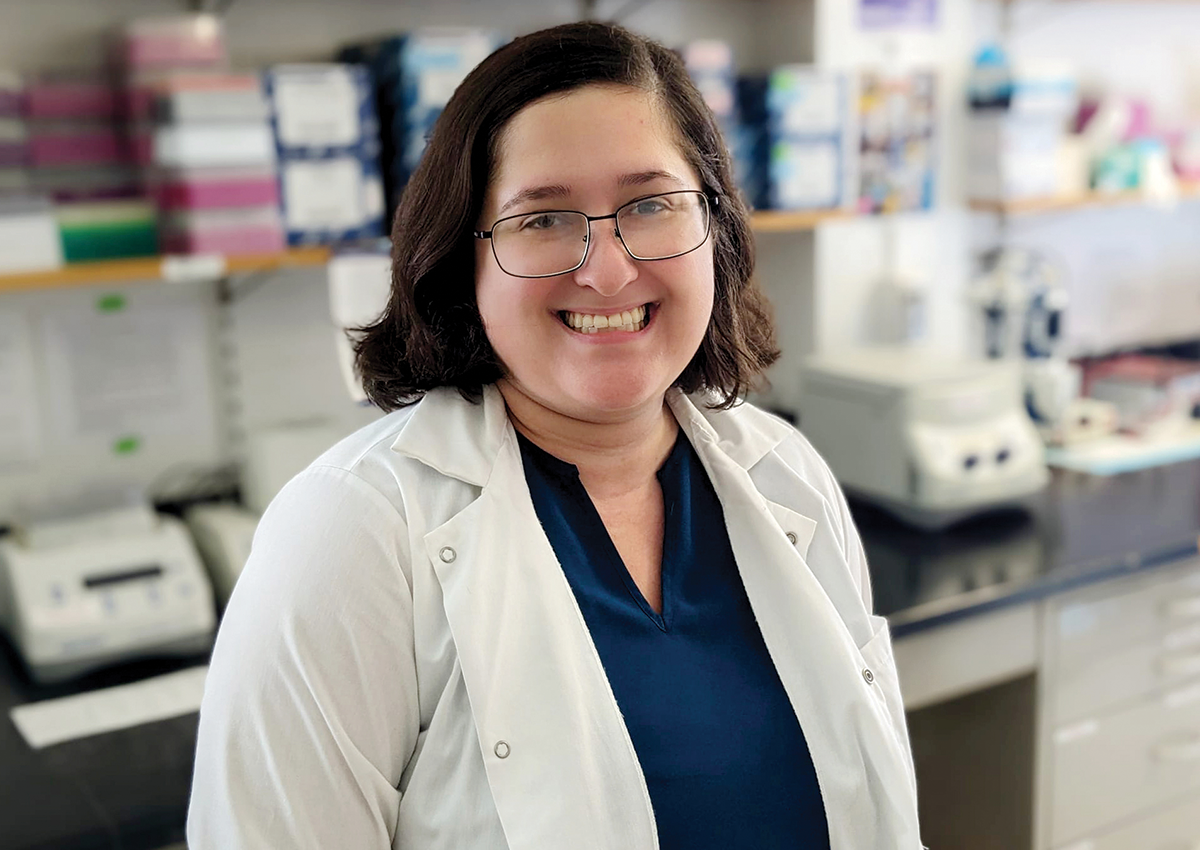
Abigail Gancz analyzes ancient microbial DNA from teeth
Abigail Gancz, an Anthropology Ph.D. candidate, immigrated from Israel to Maryland with her family at age seven. Her unique perspective as a first-generation American sparked her curiosity about the health of different populations and how diseases shift based on different socioeconomic factors. This led her to pursue a Bachelor in Public Health (B.S.P.H.) from the University of North Carolina, majoring in Biostatistics and Anthropology. She participated in various research projects and internships involving archaeological excavations, artifact processing, spatial analyses, and digital modeling. Penn State offered a perfect environment for her to continue her anthropological research and work alongside scientists who are just as excited to use data from the past to inform modern health practices.
Since joining Dr. Laura Weyrich’s lab in 2019, Abigail has earned her M.S. in Anthropology and is now working on her Ph.D. Abigail is examining the oral microbiome as an indicator of noncommunicable or chronic disease risk, based on the association between the oral microbiome, systemic inflammation, and noncommunicable diseases. She ultimately wants to understand how dietary, behavioral, and agricultural transitions have impacted the oral microbiome over time. Abigail examines the oral microbiome of ancient humans by extracting DNA from dental calculus, which is calcified plaque that preserves the oral microbiome. She then combines biological data with bioarcheological data to piece together who lived in a given community. She is most excited to contribute to a novel area of study and to see applications of ancient data in modern interventions.
In the future, Abigail hopes to use her knowledge of microbiome analyses to improve healthcare. Outside of the lab, she serves as the outreach head for the Department of Anthropology and is working with a local school district to develop Spanish language programming for the immigrant community. Additionally, she enjoys teaching laser-cutting part-time and spending time with her dog and cat.
Ana Fonseca
Doctoral Candidate, Animal Science
October 2, 2023
By Dina Constantinides
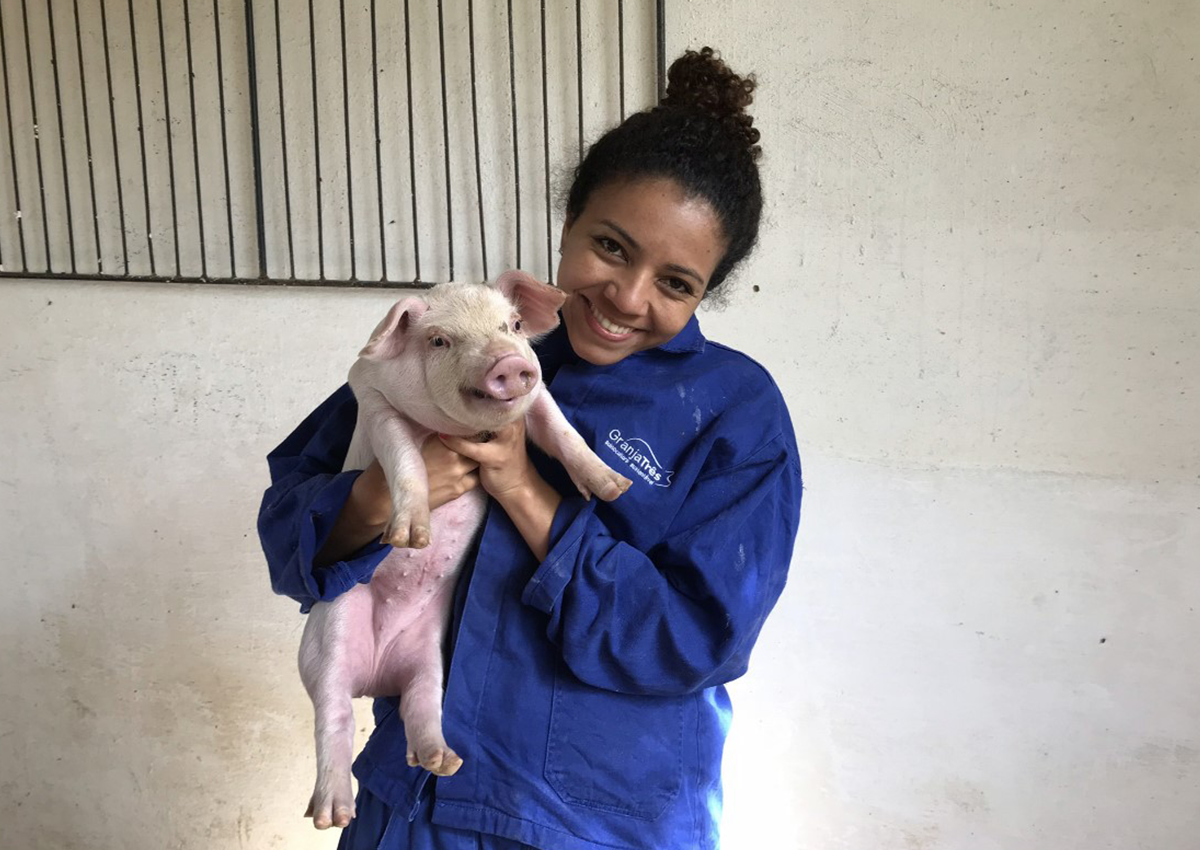
Ana is Tracking Chicken Gut Microbes to Optimize Livestock Feed
Ana Fonseca, an Animal Science Ph.D. candidate, grew up in Minas Gerais, Brazil. Exploring her interests in biology and animals, she earned a B.S. in Veterinary Medicine from the Federal University of Uberlandia. She first got involved with microbiome-related research as an exchange student at Kansas State University. Here, she contributed to a project focused on developing cow probiotics in liquid form. Later, she worked at Nuscience, a Belgian livestock feed company. After spending around 3 years developing feed products, Ana was curious about the effectiveness of different additives on the health and efficiency of poultry production.
Since joining Dr. Erika Ganda’s lab, Ana earned her M.S. in Animal Science and is expanding her research as she pursues her Ph.D. Ana is examining the effects of feed additives on the gut microbiome of chickens, as well as tracking anti-microbial resistance genes and metabolites that are correlated with chicken weight gain. Anti-microbial resistance in livestock can have serious consequences for human health, as it allows harmful bacteria, like Salmonella, to survive and contaminate meat products. Ultimately, she aims to optimize the safety and productivity of poultry production, and fill gaps in animal microbiome knowledge. Ana is most excited about exploring the metabolome and the potential downstream practical applications of her work, like farmers using microbiome-informed animal feed to reduce disease potential and improve chicken health and size.
Ana plans to return to the industry sector after earning her Ph.D. and continue to be challenged as a research professional. Outside of the lab, she enjoys traveling, hiking, and visiting local animal shelters.
Sarah Richards
Doctoral Candidate, Ecology; International Agriculture & Development
September 19, 2023
By Dina Constantinides
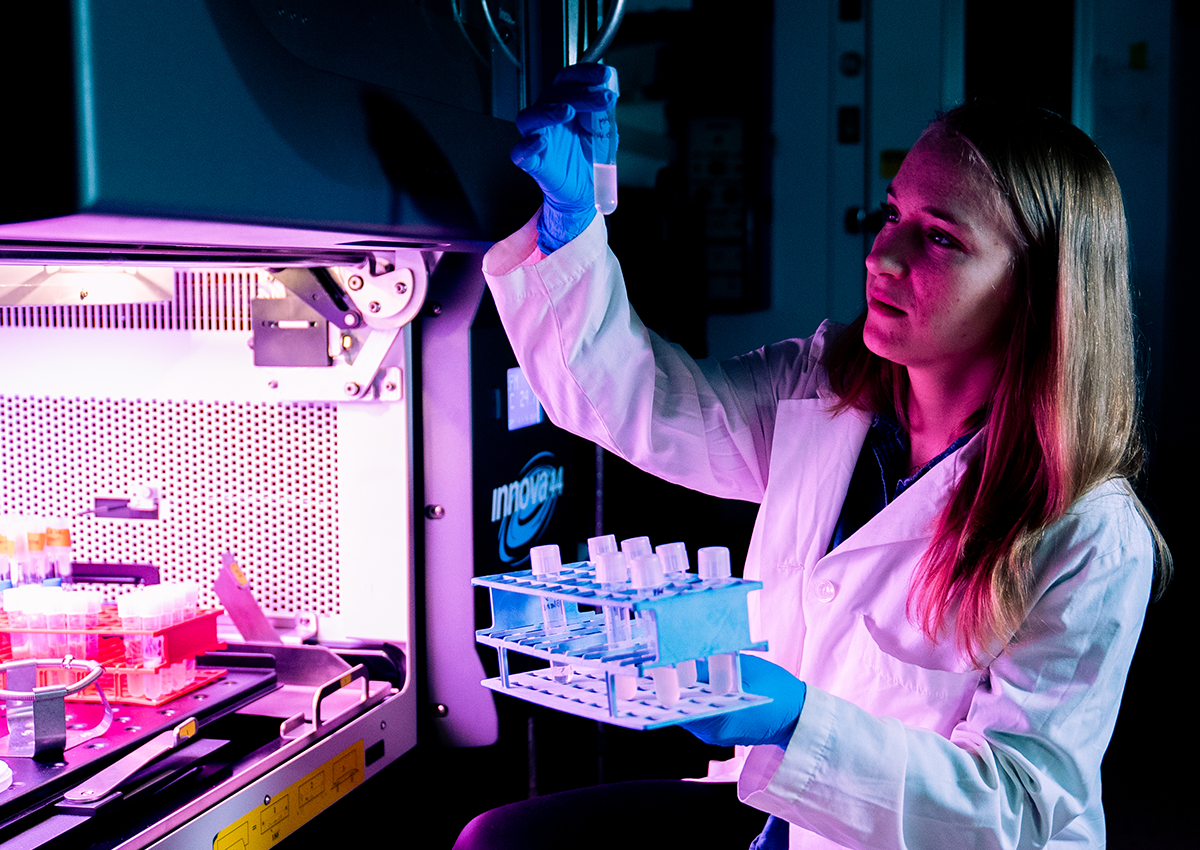
Sarah Richards is training microbes for sustainable farming
Sarah Richards, a dual-title Ph.D. candidate in Ecology and International Agriculture & Development (INTAD), grew up in a small New Hampshire town. She has been fascinated with microbes ever since growing “goopy” bacteria in a biology course, leading her to pursue a bachelor's degree in microbiology with a minor in Nutrition from the University of New Hampshire. After graduation, Sarah worked on a research and development team at an agricultural biotechnology company – Indigo Ag. While helping to develop microbial applications for crops, she wondered what factors contributed to the successful establishment of microbes in new environments.
Now as a member of Dr. Estelle Couradeau’s lab, Sarah aims to condition or train microbes to more effectively establish and persist when introduced to new environments – a major limitation with current live microbial therapeutics. Additionally, she is examining the impacts of farming practices on soil microbiomes, such as cover crop diversity. As the first Ecology program student to participate in the INTAD dual-title program, she has developed international collaborations with scientists and farms, expertly navigating language and cultural barriers. This was exemplified in her recent trip to Uganda with Penn State and Michigan State researchers, where she met local farmers, policymakers, and students to discuss farm management and challenges. Next, Sarah has plans to study how Costa Rican coffee farms’ intercropping practices influence soil microbiota.
Sarah is motivated by the practical applications of her microbiome research and its potential implications for sustainable agriculture. Furthermore, she views microbial research as a way to connect with nature through the invisible world. Outside of research, Sarah enjoys rock climbing, tennis, and making microbiology art.
Luana Bresciani
Doctoral Candidate, Ecology
April 27, 2023
By Nichole Ginnan
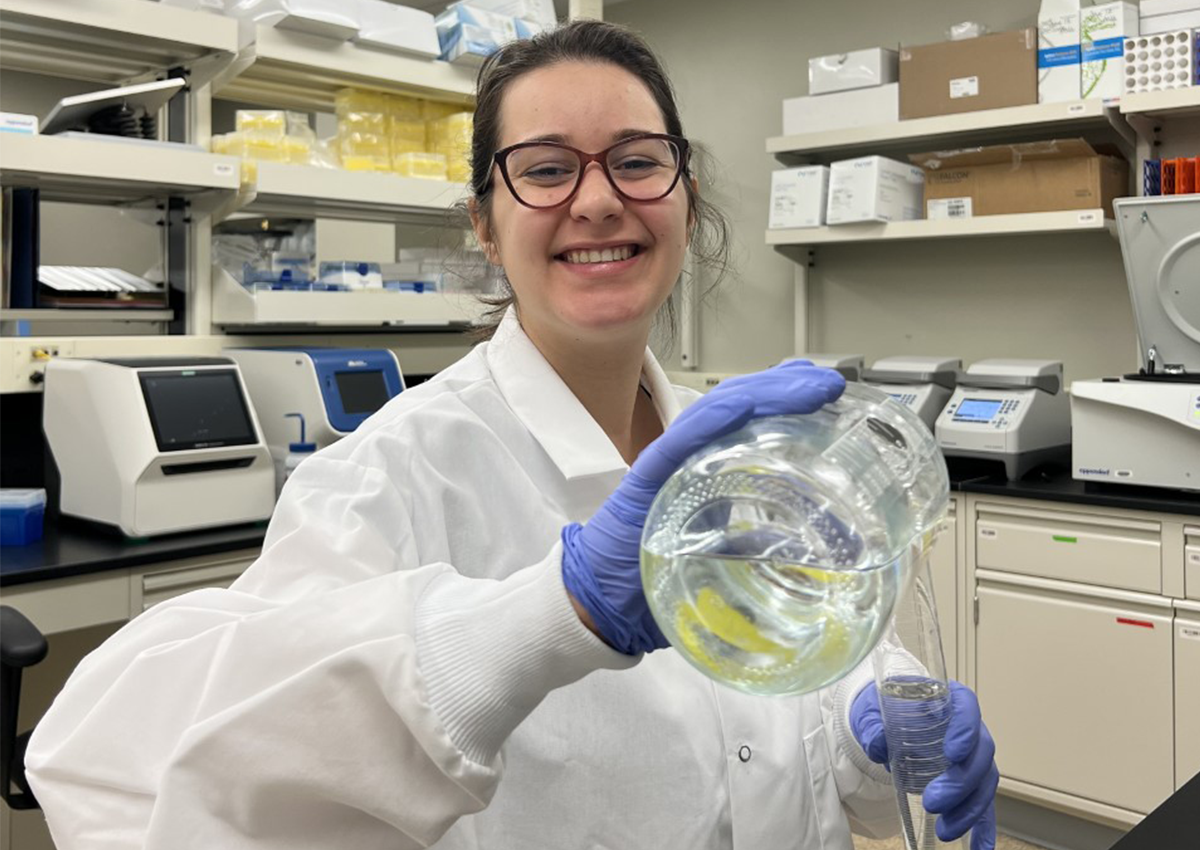
Luana is unraveling microbiome coalescence
Luana Bresciani, an Ecology PhD candidate, grew up in Brazil and completed her bachelor's and master's degrees at the University of São Paulo. During her master’s, she carried out agronomy research focused on the impacts of soil coverage on coffee and sugarcane soil microbiomes. These studies developed Luana’s interest in soil microbial communities, as she pondered the effects these treatments were having on the composition and function of the microbiome.
Now as a member of Dr. Francisco Dini-Andreote's Lab, Luana is studying microbiome coalescence or what happens when microbial communities merge. Examples of events that lead to microbiome mixing include a leaf falling to the ground or farmers adding manure to crop fields. Luana is exploring community coalescences by mixing soil microbial communities and evaluating compositional and functional changes over time. She is most excited about potential emerging properties in these mixed microbiomes, that were not present in either of the original communities.
Luana views research as detective work and looks forward to running her own academic lab in the future. Outside of the lab, she enjoys running, badminton, and other outdoor activities.
Mallorie Smith
Undergraduate Student, Biology
April 11, 2023
By Nichole Ginnan
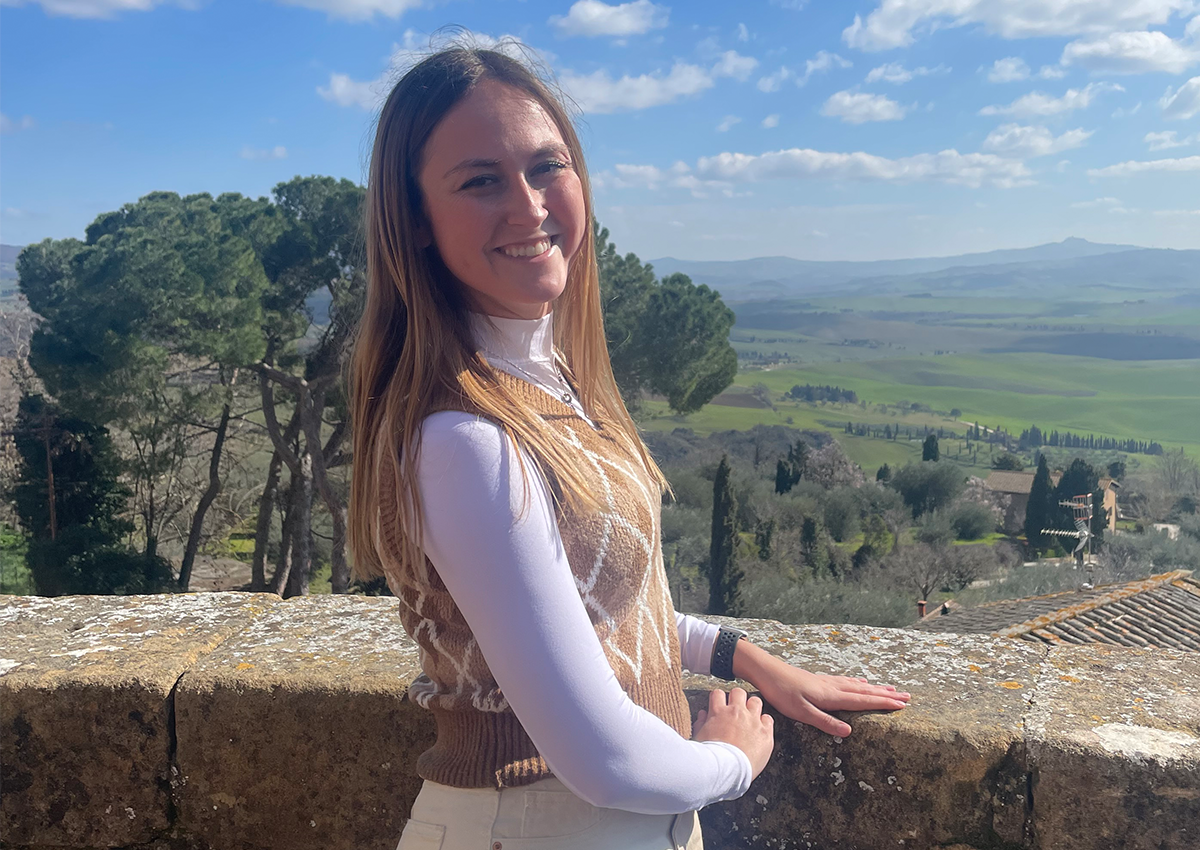
Mallorie is comparing soil- and microplastic-associated microbes
Mallorie Smith, an undergraduate biology student at Penn State Altoona, has always been interested in the things we cannot see with our naked eye, like microbes and DNA. This enthusiasm for the unseen world led her to microbial research.
For the past year, Mallorie has been working in Dr. Corien Bakermans’ Lab, where she is developing fundamental research and molecular biology skills. Mallorie has extracted DNA from a number of samples, including freshwater sediment and microplastics. Mallorie notes that extracting microbial DNA from plastics is particularly difficult because the plastic can be reactive to the extraction reagents. The microbial communities of these samples will be compared, with a focus on identifying potential microplastic degrading microbes.
Outside of the lab, Mallorie is a soccer player on the Altoona women’s team. During the summer, she works with children at a summer camp. Mallorie was recently awarded the Peachman Scholarship and intends to pursue a graduate degree in forensic science.
Josue Ceron
Doctoral Candidate, Biochemistry, Microbiology, and Molecular Biology
March 28, 2023
By Nichole Ginnan
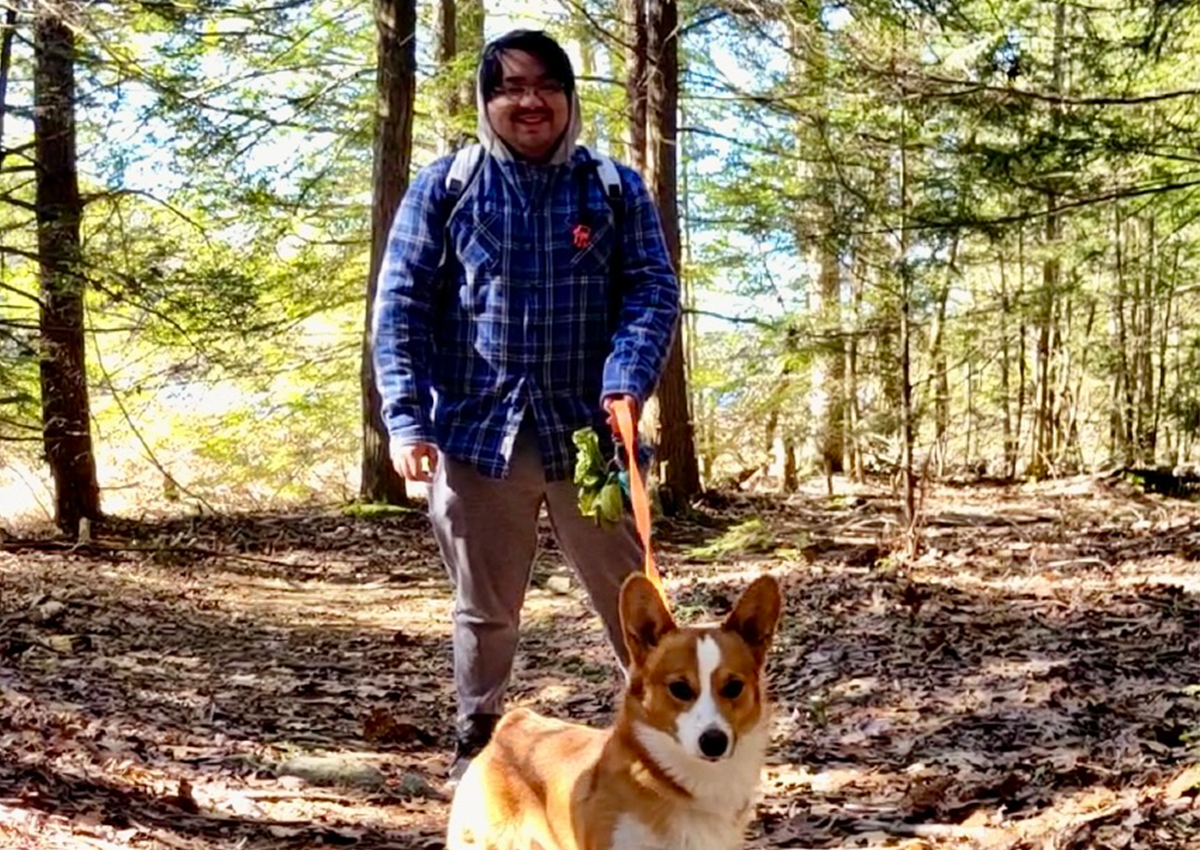
Josue is dissecting squid–Vibrio (bioluminescent bacterium) symbiosis
Josue Ceron, a PhD candidate in Biochemistry, Microbiology, and Molecular Biology, is a first-generation college student who attended Skyline Community College and San Francisco State University (SFSU) in California. He first got his start in research exploring plant-microbe symbiosis in Dr. Joseph Chen’s lab at SFSU. While presenting his undergraduate research at a SACNAS conference, he met his now graduate advisor Dr. Timothy Miyashiro.
As a member of the Miyashiro Lab, Josue studies Vibrio fischeri, an essential bacterial symbiont of the Hawaiian bobtail squid (Euprymna scolopes). V. fisheri is a bioluminescent (light producing) bacterium that colonizes a specialized organ in the squid. The light produced by the bacterium offsets the squids shadow cast by the moonlight–camouflaging it from other nocturnal marine animals.
Specifically, Josue is researching what host environmental factors select for bioluminescent bacteria, such as oxidative stress or nutrients. Using a functional genomics approach, Josue mutates V. fisheri and measures changes in colonization and growth. Overall, this work will provide valuable insight into the molecular mechanisms underlying host-microbe symbioses.
Outside of the lab, Josue enjoys hiking, trying new restaurants, and reading science fiction. His future plans include a postdoctoral research position at the National Institutes of Health (NIH).
Victoria Pearce
Doctoral Candidate, Biomedical Sciences
March 14, 2023
By Nichole Ginnan
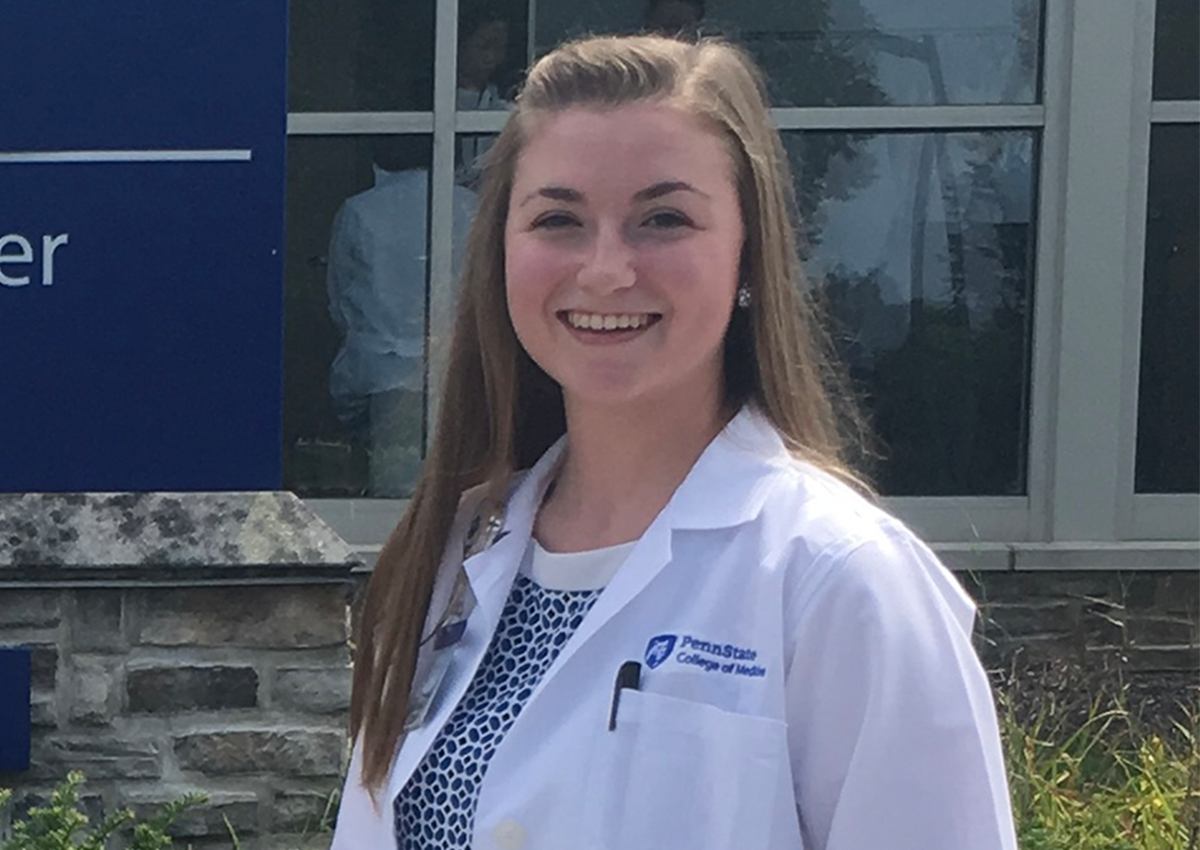
Victoria is modulating gut microbiota composition and activities
Victoria Pearce, a Biomedical Sciences PhD candidate, is a first-generation college student who grew up in Western Pennsylvania. She completed her bachelor’s degree at Youngstown State University in Ohio. Here, she discovered her interest in microbial and biomedical research while studying fungal pathogen virulence factors.
Now as a member of Guy Townsend’s lab, Victoria is investigating the gut microbiota and how we can manipulate bacterial abundance. Specifically, she is focused on finding the signal– the on-off switch– of a bacterial transcription factor (protein that controls gene expression) involved in Bacteroides spp colonization in the mammalian gut. Bacteroides are a highly abundant gut bacterial genus that may provide protection from pathogens and supplies nutrients to other commensal bacteria. In patients with gastrointestinal diseases, such as Crohn’s disease, Bacteroides’ abundance is significantly reduced, when compared to healthy patients. Victoria notes that uncovering the specific signal involved in regulating this transcription factor, could help us control Bacteroides abundance, and aid in the development of microbial-focused therapies to suppress disease.
Outside of the lab, Victoria is an avid science communicator and writer. She serves as a writer and senior editor for the College of Medicine’s science blog– Lions Talk Science– and is a lead technical editor for the Journal of Student-Run Clinics. After completing her PhD, Victoria plans to pursue a career in science/medical writing. In addition to her research and writing, she has numerous musical talents and has been a member of Med Notes, an acapella group on the Hershey campus.
Tarik Acevedo
Doctoral Candidate, Ecology
February 22, 2023
By Nichole Ginnan
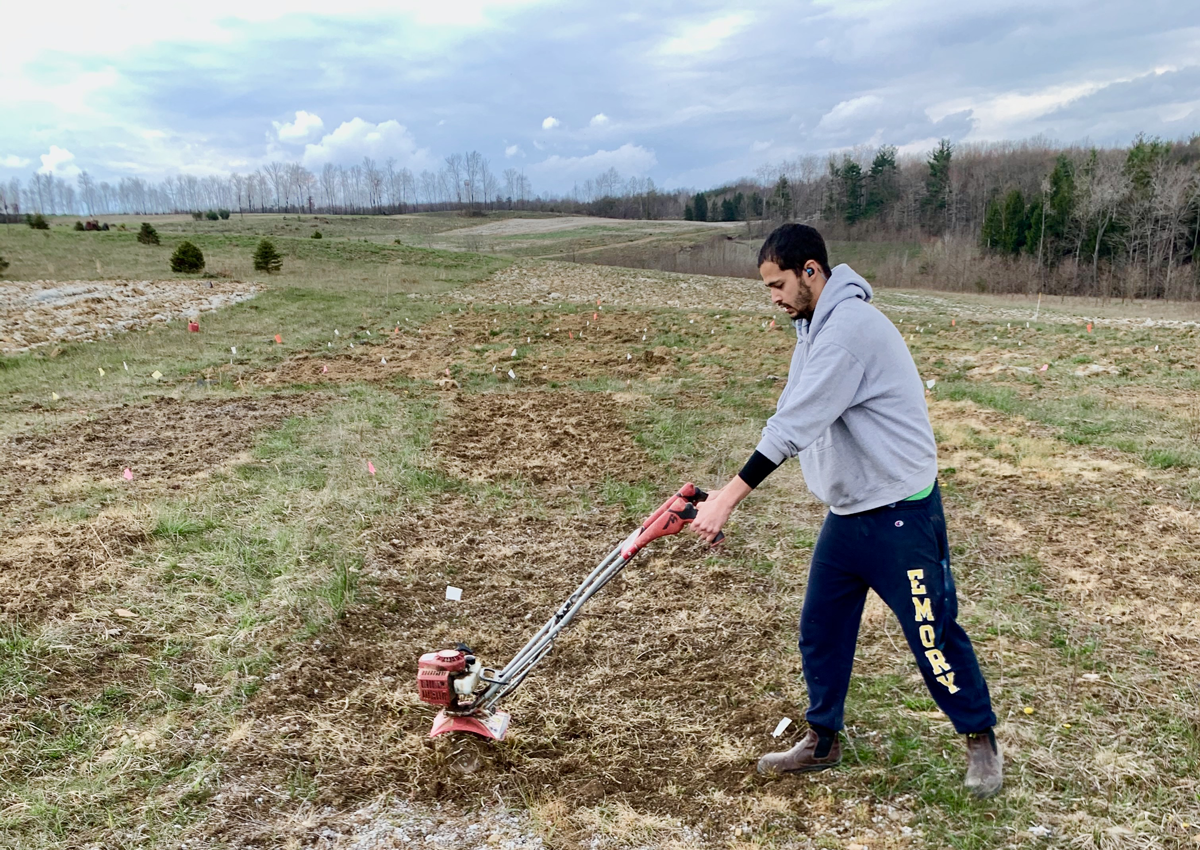
Tarik is restoring microbial functionality in degraded mined lands soil
Tarik Acevedo, an Ecology Ph.D. Candidate, was born and raised in Puerto Rico. He got his start in research at Emory University in an insect-microbe symbiosis lab as a technician.
Now, as a member of Dr. Mary Ann Bruns’ Lab, Tarik is measuring soil microbial community functionality to understand the impacts of various degraded mined land soil reclamation strategies. He has specifically focused on closed coal strip mines, which leave behind soil that is heavily compacted, acidified, and has low microbial diversity and activity. Current efforts to restore plant life and animal habitats in these barren regions have focused more on planting fast growing plants, rather than improving the soil quality for long-term reclamation. Tarik’s preliminary findings indicate that agricultural management strategies, like cover crops, improve soil quality and microbial functionality better than standard reclamation practices.
During his time at Penn State, Tarik was awarded a prestigious NSF Graduate research fellowship and was accepted into the Sloan Scholars Program. Additionally, he held an officer role in the PSU Science Policy Society, where he has developed his interests in improving policy and science funding by making research findings clear and accessible. On his free time Tarik enjoys fishing.
Erica Ryu
Doctoral Student, Biology
January 31, 2023
By Nichole Ginnan
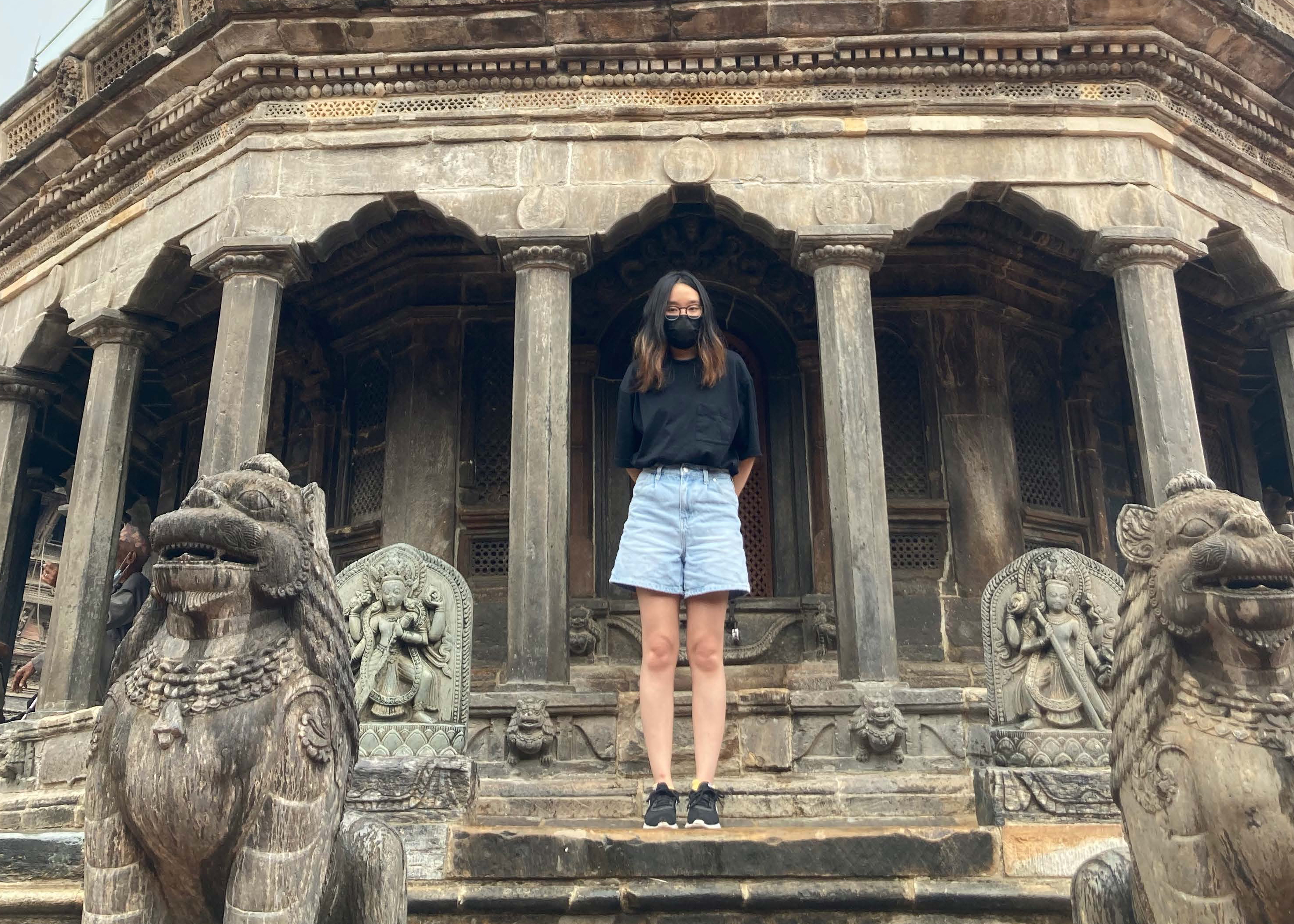
Erica is deciphering the impact of lifestyle on oral and gut microbiomes
Erica Ryu, a Biology PhD candidate, got her start in research as an undergraduate assistant at Washington University in St. Louis. After earning her bachelor’s, she worked for a software company, but soon decided to return to academic research as a lab technician at the University of Missouri - St. Louis. Here she contributed to empirical models of bacterial evolution and growth.
Now as a member of Dr. Emily Davenport’s lab, she is investigating the impact of lifestyle (diet, teeth brushing, etc.) on human oral and gut microbiomes. Additionally, Erica is using single-cell transcriptomics to link spatial gene expression along sections of the intestinal track, with varying levels of inflammation, to microbiome patterns. Examining gut microbe associations with host gene expression at this scale will advance our understanding of the microbiome’s role in disease. Erica is enthusiastic about the potential downstream applications of her research in health, particularly for managing inflammatory bowel syndrome.
Outside of research, Erica likes baking and gaming, as well as hip hop dancing. She notes that it is important to have the courage to follow new paths.
Jenn Harris
Doctoral Student, Ecology
January 17, 2023
By Nichole Ginnan
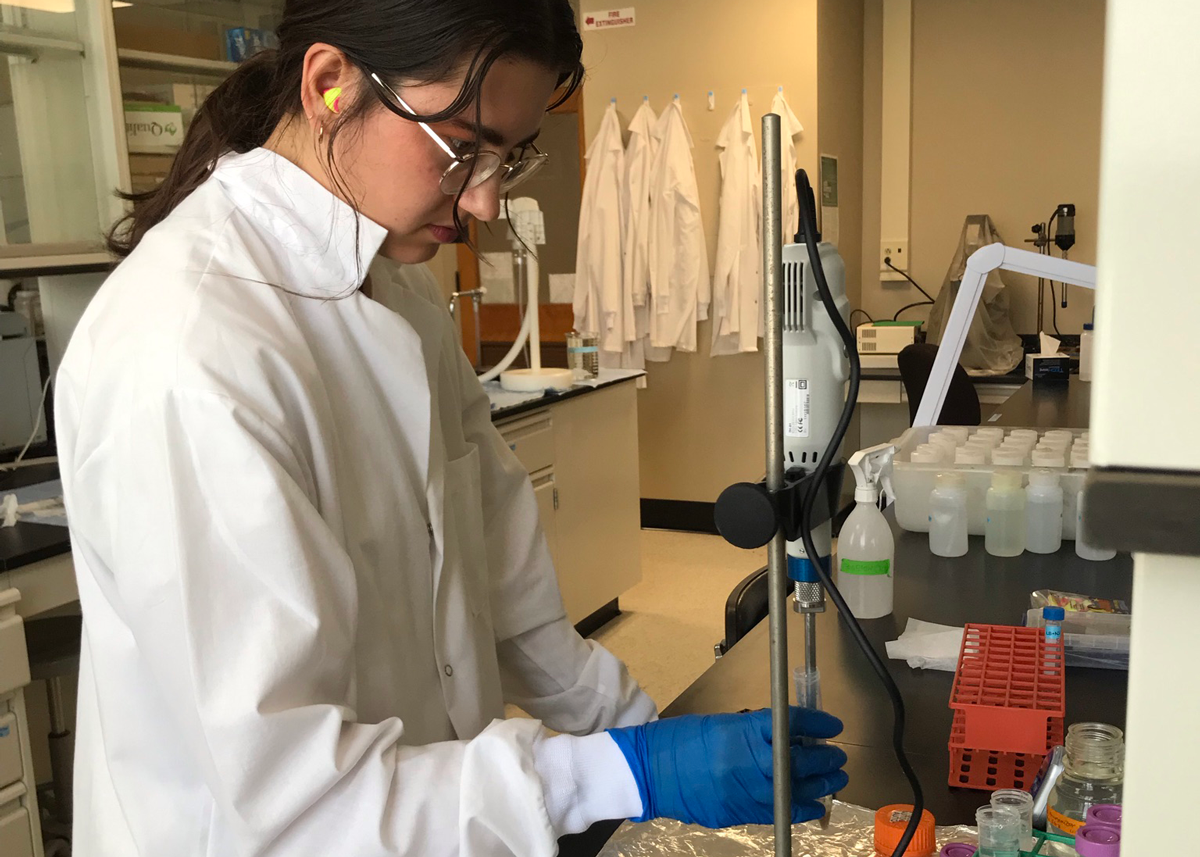
Jenn is exploring bacterial evolution in the field
Jenn Harris, an Ecology PhD student, has always had an interest in how environmental factors influence larger ecosystem processes. As an undergraduate, she investigated the effects of climate change on forest insect ecology and decomposition. Appreciating the broader issues, Jenn was inspired to aid in developing sustainable solutions for managing the consequences of rapid global change. This led her to a position at Indigo, an agricultural biotech company, where she contributed to the research and development of microbial-focused crop applications.
Now as a member of Drs. Liana Burghardt’s and Estelle Couradeau’s Labs, she is continuing to explore how plant-associated microbes interact with different crops. Specifically, Jenn is investigating how Rhizobia, a plant bacterial symbiont, evolve with various cover crops (e.g., clover and alfalfa). Rhizobia are nitrogen-fixing bacteria that can significantly improve soil fertility and plant growth. Understanding rhizobial trait selection in association with different cover crops could help farmers optimize crop/soil management strategies and increase cash crop yields.
Outside of research, Jenn has participated on the Penn State cross-country team and has a growing interest in science-focused community outreach. Jenn notes the importance of finding good mentors and feels fortunate to have a supportive network within and outside of academia.
Terry Torres-Cruz
Doctoral Candidate, Plant Pathology, Biogeochemistry
December 13, 2022
By Nichole Ginnan
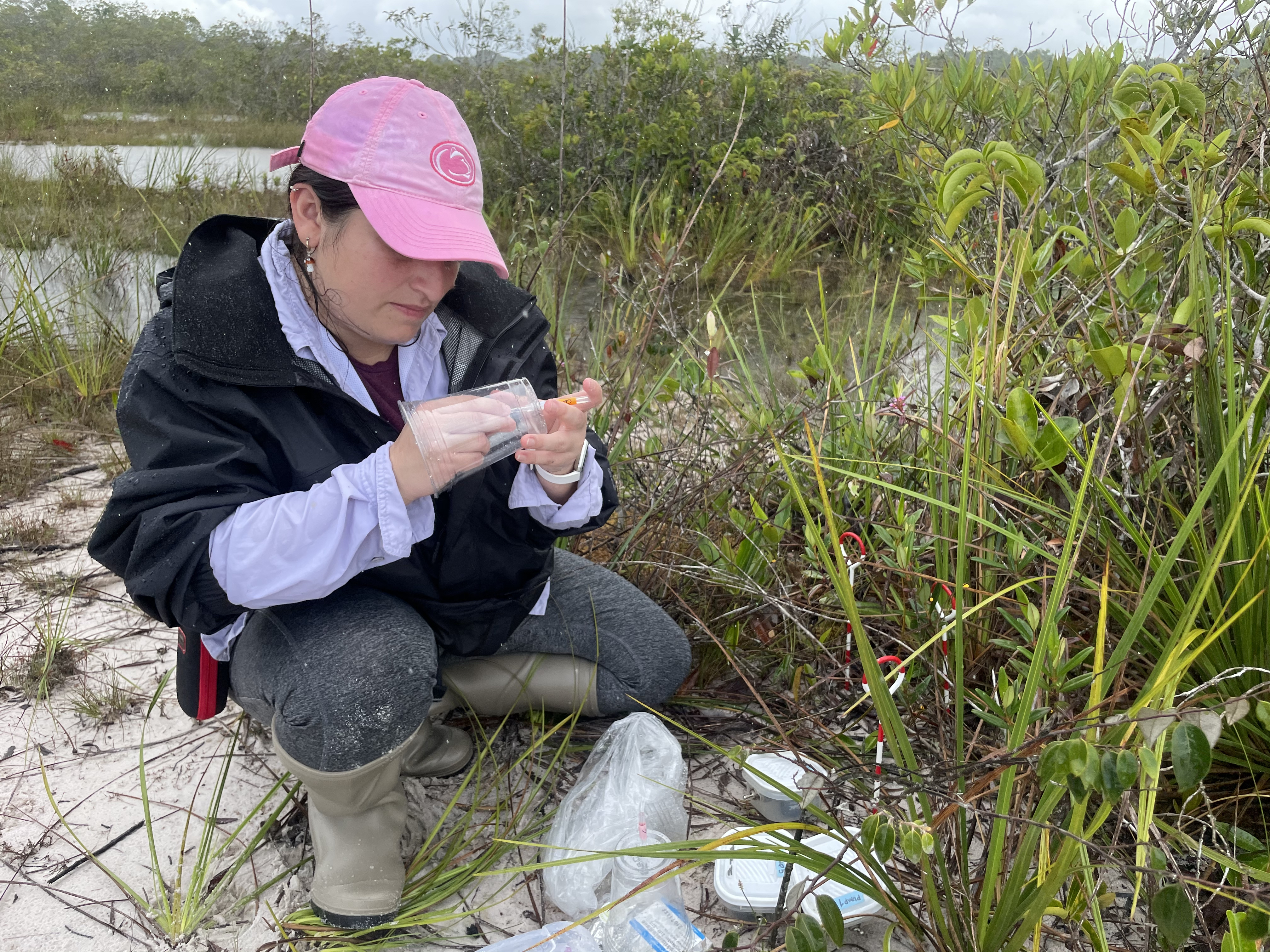
Terry is characterizing rare fungal pseudoflowers
Terry Torres-Cruz, a dual title Plant Pathology and Biogeochemistry PhD candidate, grew up in Costa Rica and received a B.S. from the prestigious Biotechnology Engineering program at Instituto Tecnológico de Costa Rica. Her undergraduate research focused on heavy metal resistance in soil fungi, and this sparked a longstanding interest in mycology. Later, she worked for the US Geological Survey as a field technician, which involved extensive field work.
Now as a member of Dr. David Geiser’s Lab, Terry uses her mycological and field skills to study a unique phenomenon called pseudoflowers–fungal structures disguised as plant floral tissues. Specifically, she focuses on the rare instance of a fungal Fusarium sp producing pseudoflowers that are entirely made of fungal tissue. These unique pseudoflowers have only been seen on yellow-eyed grasses in Guyana and are potentially a floral mimicry system. Terry’s research has involved coordinating field teams of forest rangers and undergraduates. These studies confirmed that pollinators and other insects interact with these flower imposters. This suggests the fungi may be dispersed via an insect-mediated mechanism. In 2021, Terry received the “Give a DAWG a Bone” award to sequence the other fungi and bacteria associated with these structures, which potentially aid in attracting insect vectors.
Additionally, Terry has held numerous leadership roles in internal/external organizations, including the PSU Graduate and Professional Student Association, the Penn State SACNAS Chapter, the Mycological Society of America (MSA), and more. Remarkably, through her advocacy work and diverse undergraduate mentor roles, Terry is actively improving equity in higher education and STEM.
Sterling Wright
Doctoral Student, Anthropology
December 6, 2022
By Nichole Ginnan
Sterling is reconstructing the past using ancient oral microbial DNA
Sterling Wright was first introduced to anthropology while taking an undergraduate course about ancient Greece. Now, as an Anthropology PhD student and a member of Dr. Laura Weyrich’s lab, he is leading research on humans from hundreds to thousands of years ago. Specifically, he is using ancient DNA from up to 4,000-year-old calcified human teeth to understand the impacts of urbanization on oral microbiomes and human health. Sterling is particularly focused on changes in periodontal disease (infection of the gums) frequency and how the oral microbiome has changed over time. These projects target ancient and modern Romanian populations, in addition to ancient Georgian populations.
Supported by several prestigious research travel awards, including the National Geographic Early Career Grant, Sterling has traveled to a number of archaeological sites. He also collaborates with museum curators and other academics to obtain his research samples. Furthermore, Sterling recently received the internal “Give a DAWG a Bone” award from the Data Analysis Working Group, which will support a microbiome sequencing project. With a collaborative spirit, he appreciates the simple acts of discovering and exchanging knowledge about the past. Outside of work, Sterling can be found on the tennis court.
Colin Howe
Doctoral Student, Biology
November 29, 2022
By Nichole Ginnan
Colin is exploring dynamic coral microbiomes
Colin Howe, a PhD student in Biology and a member of Dr. Monica Media's lab, spent part of his childhood in Japan and frequently visited the Carribean Islands where his parents grew up. These experiences laid the foundation for his interest in marine biology, but also his understanding of how marine systems impact the local culture, and vice versa. Colin completed his master's at the University of the Virgin Islands. His participation in the NSF INCLUDES: Supporting Emerging Aquatic Scientists (SEAS) Island Alliance first brought him to PSU. Inspired by the Medina lab's integration of tropical marine ecology and microbiology, he joined the biology program as a PhD student. Colin aims to unravel coral-microbe relationships beyond the well-studied dinoflagellate symbionts. Coral-associated microbiomes could be the key to preserving reef health under the pressures of climate change. Colin is keen to tease apart these microbial communities to identify which microbes are active core members of the microbiome and which are simply passive transients. Characterizing the coral microbiome will support innovative research towards disentangling the complex, yet intricate relations that exist between coral host and their microbes. Colin's studies will include environmentally collected and lab-cultivated specimens, as well as utilize ancient DNA approaches to define microbial communities of skeletonized coral fossils.
Throughout his time in marine sciences, Colin observed that researcher demographics do not reflect the populations that are most impacted by the failure and success of these environments (e.g., coral reefs). As such, Colin is an avid advocate for increasing social and ethnic diversity in this field. As an effective science communicator, Colin creates informational videos and has spoken on podcasts and panels about his experiences and science identity. Outside of research and SciCom activities, Colin enjoys various water activities, including scuba diving, kayaking, and swimming.
Taejung Chung
Doctoral Candidate, Food Science
November 22, 2022
By Nichole Ginnan
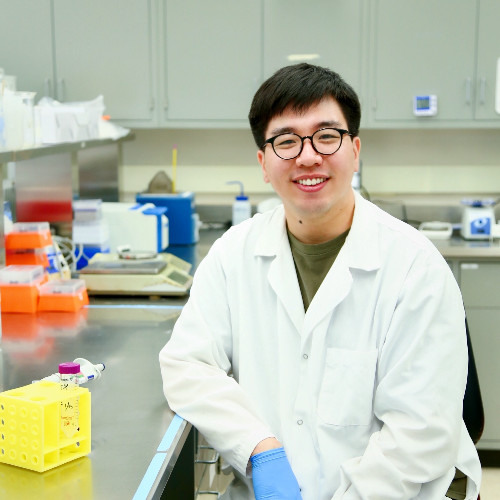
Taejung is enhancing food-borne pathogen surveillance
Taejung Chung is a doctoral candidate in the Department of Food Science and the current director of DAWG (Data Analysis Working Group). As a member of the Kovac lab, Chung employs high-throughput sequencing of microbial marker genes and metagenomes to study how food-borne pathogens, such as Salmonella, impact surface water (e.g., streams) microbial ecology.
The use of contaminated water in fresh produce production introduces considerable risk and could cause food-borne disease outbreaks. Intriguingly, he is advancing food-borne pathogen surveillance using machine learning classifiers to identify biomarkers of contaminated water and reduce human health risk. Read more about this exciting research in his recent pre-print (DOI: 2022.07.11.499664).
Additionally, Chung is utilizing the skills he developed in the lab to boost data analysis training through his position in DAWG. He is motivated to help others take their data from the sequencer to publishing. Noting that he greatly enjoys participating in this supportive community.
Outside of work Taejung likes to watch sports, including basketball, soccer, and football.